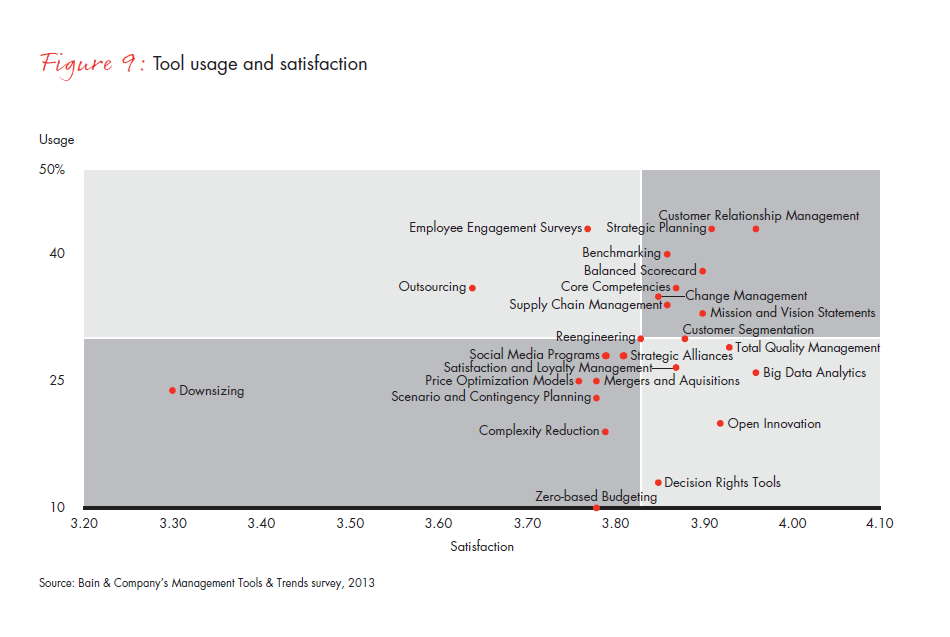June 7, 2013 |
The ability to benchmark your organization’s performance is expanding quickly. Services for metric benchmarking, as well as qualitative (or best practice) benchmarking are growing and expanding. The market has solved barriers around security and confidentiality. If you don’t have a benchmarking source that can guarantee you that level of trust, you need to find another relationship.
Benchmarking is enduring
Bain & Company just released the update of their research into the management tools used by global organizations, Management Tools & Trends 2013. Benchmarking has never fallen out of the list of top 5 most often used tools, and this year, they created a quadrant diagram showing the tools rated for usage and satisfaction. As seen below, benchmarking landed in their magic quadrant.

Bain also notes a significant trend among all the tools, benchmarking included.
“Given the challenges to growth and the competing demands for investments, companies now take a more thoughtful and strategic approach to tools instead of jumping on the latest tool fad… Among the key lessons we’ve learned over the past 20 years is that executives need to champion an enduring strategy, find the right tools and then adapt the tools to the companies—not vice versa.”
APQC’s research shows the same trends of enduring use of benchmarking, as well as coupling benchmarking with other long-term focused process improvement approaches, tools, and methodologies. It is here to stay and expanding.
If you snooze, you lose (competitiveness, that is)
As I’ve covered in other posts in this series, excuses about relevance like “they aren’t like us” are all just easy ways to get out of having to actually think . And while you are making excuses, others are expanding their learning through benchmarking.
Some stats from APQC’s benchmarking services help show this expansion in consumption.
Within our metric benchmarking service focused solely on finance and accounting processes, there are:
-
Over 1,500 discrete measures describing various enterprise processes regarding cost, cycle time, staff productivity, etc.
-
Over 400,000 discrete metric values from over 12,000 submissions (and resulting benchmarking reports issued) for those measures across various peer groups like industry, organizational size (measured by either annual revenue or headcount), geography (down to the Country level), etc.
Across out entire best-practice knowledge base (for all organizational processes), we have over 14,000 unique downloads of best practice content each month.
Gradual isn’t good enough
If you can’t find a relevant peer group within that volume of information, the problem isn’t the information. It’s you. So, benchmarking is expanding and the folks that are consuming this information represent avid learners. Learn fast or be left behind. Benchmarking helps you learn faster.
Don’t believe me, here is a relevant post by Seth Godin. Get started!
Tags: Bain & Company, benchmarking, Editor's Choice, featured, learning, SubFeature1
Follow us!
Subscribe to our e-mail newsletter to receive updates.





 All Things D
All Things D ARS Technica
ARS Technica Engadget
Engadget GigaOM
GigaOM Mashable
Mashable TechCrunch
TechCrunch The Verge
The Verge Venture Beat
Venture Beat Wired
Wired Chris Brogan
Chris Brogan Brian Solis
Brian Solis Chris Dixon
Chris Dixon Clay Shirky Blog
Clay Shirky Blog HBR Blog
HBR Blog IT Redux
IT Redux Jeremiah Owyang
Jeremiah Owyang Radar O'Reilly
Radar O'Reilly Seth Godin Blog
Seth Godin Blog SocialMedia Today
SocialMedia Today Solve for Interesting
Solve for Interesting The TIBCO Blog
The TIBCO Blog Lifehacker
Lifehacker

Show me one innovative practice that ever resulted from benchmarking? There are innovators and leaders, and then those who copy or follow. How much creativity or real thinking is there in following? While there is some value in understanding what others are doing, it is NOT found in following which is the most common application of benchmarking.
Ron, you didn’t read Godin’s article. Read the whole article, not just the first couple of paragraphs. I don’t think he means what you think he means.
Donald, after reading the end of my post again, I understand your point about the Godin article. I’ve changed the last sentence to better align with the point I wanted to make.
Thanks for the input!
Donald,
I have to disagree on both points you make. I can point you to several examples of innovation that have resulted from benchmarking. I have never seen a case where an organization is able to learn from another organization and simply copy what they are doing. Every organization differs from the perspective of culture, technology, process, etc. Innovation comes from learning how several organizations approach the issue being benchmarked, understand what enables them to be successful, then taking the bits and pieces that will work in your organization and building a new approach from that composite of many.
On Godin’s article, I have read the entire post, and support the same point in my blog as it pertains to benchmarking. If you are going to try and benchmark once to have a huge shift in performance, don’t even attempt it. It won’t work. Benchmarking is about the ability to integrate the external information and data you have access to into your long-term improvement approaches. It is about getting started and staying focused. Most people wait around for the precise benchmarking opportunity before doing anything. They say, “they aren’t like us” and wait and wait while the rest of the world focuses on moving forward with all the tools available to them. As Seth says, “they ship”.
Reblogueó esto en aplicanube.